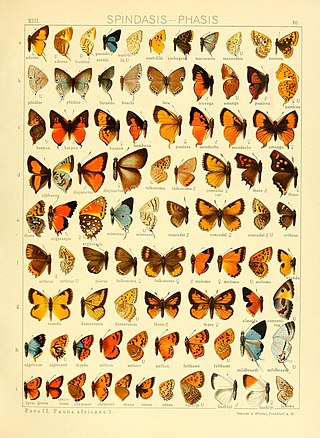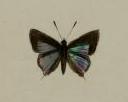
The superfamily Papilionoidea contains all the butterflies except for the moth-like Hedyloidea.

Lycaenidae is the second-largest family of butterflies, with over 6,000 species worldwide, whose members are also called gossamer-winged butterflies. They constitute about 30% of the known butterfly species.

Riodinidae is the family of metalmark butterflies. The common name "metalmarks" refers to the small, metallic-looking spots commonly found on their wings. The 1,532 species are placed in 146 genera. Although mostly Neotropical in distribution, the family is also represented both in the Nearctic, Palearctic, Australasian (Dicallaneura), Afrotropic, and Indomalayan realms.

Miletinae is a subfamily of the family Lycaenidae of butterflies, commonly called harvesters and woolly legs, and virtually unique among butterflies in having predatory larvae. Miletinae are entirely aphytophagous. The ecology of the Miletinae is little understood, but adults and larvae live in association with ants, and most known species feed on Hemiptera, though some, like Liphyra, feed on the ants themselves. The butterflies, ants, and hemipterans, in some cases, seem to have complex symbiotic relationships benefiting all.

Polyommatinae, the blues, are a diverse subfamily of gossamer-winged butterflies.

The Aphnaeinae are a subfamily of butterflies in the family Lycaenidae.

Chloroselas is a genus of butterflies in the family Lycaenidae. The species of this genus are found in the Afrotropical realm.

Chloroselas pseudozeritis, the brilliant gem, is a butterfly of the family Lycaenidae. It is found in southern Africa.

Chloroselas mazoensis, the purple gem, is a butterfly of the family Lycaenidae. It is found in South Africa, in northern KwaZulu-Natal, Mpumalanga, Limpopo and North West provinces. It is also found in Zimbabwe.
Chloroselas arabica is a butterfly in the family Lycaenidae. It is found in Yemen and Somaliland.
Chloroselas argentea, the silver gem, is a butterfly in the family Lycaenidae. It is found in Zimbabwe. The habitat consists of Brachystegia woodland.
Chloroselas azurea, the azure gem, is a butterfly in the family Lycaenidae. It is found in central and eastern Kenya and north-eastern Tanzania. The habitat consists of dry savanna.

Chloroselas esmeralda, the Somali gem, is a butterfly in the family Lycaenidae. It is found in Somalia, Ethiopia, Kenya, Uganda, Tanzania, Yemen and Oman. The habitat consists of arid savanna.
Chloroselas ogadenensis is a butterfly in the family Lycaenidae. It is found in Somalia.
Chloroselas overlaeti is a butterfly in the family Lycaenidae. It is found in the Democratic Republic of the Congo, Zambia and Tanzania.
Chloroselas tamaniba is a Butterfly in the family Lycaenidae. It is found in Sudan.
Chloroselas taposana is a butterfly in the family Lycaenidae. It is found in South Sudan.
Chloroselas vansomereni, the Van Someren's gem, is a butterfly in the family Lycaenidae. It is found in Kenya.
Lieutenant-Colonel Thomas Herbert Elliot Jackson was an English coffee farmer in Kenya. He served as an officer in the British Army during the Second World War, seeing service with the King's African Rifles and as a military administrator in British Somaliland. Jackson served in the Kenyan colonial administration during the Mau Mau Rebellion.







